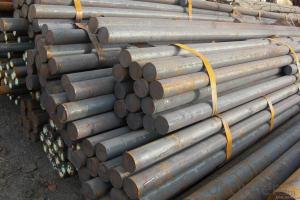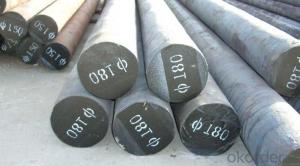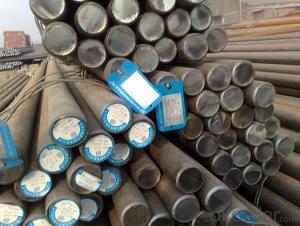High Hardness Carbon Steel S45C CK45 1045
- Loading Port:
- China main port
- Payment Terms:
- TT OR LC
- Min Order Qty:
- 30 m.t.
- Supply Capability:
- 10000 m.t./month
OKorder Service Pledge
OKorder Financial Service
You Might Also Like
Item specifice
High Hardness Carbon Steel S45C CK45 1045
Product Information:
1. Small quantity, short time delivery
If we have stocks, we can ship from a minimum of 1 kg sample in a few days.
We also manufacture custom-order materials in amounts of 300 kg and up
(Some materials are allowed 50 kg) in as few as 3 weeks.
2. High-precision thickness
We guarantee thickness tolerances that cannot be reproduced by competitors.
Example:
t <0.30mm Tolerance ±1 - 3 μm guaranteed
0.30 mm≤t Tolerance ± 1% guaranteed
3. Ability to add multiple features
We are capable of adding a variety of features to metallic materials
(resin coating, plating, bonding different kinds of metal, multigage skiving, etc.).
4. Unique technology and custom-made solutions
We provide customed solutions to your problems with our unique
technologies and well versed knowledge of materials acquired through
our experience of manufacturing 50,000 items.
5. Choose the appropriate base metals for your needs
We carefully balance quality, delivery time and price,
procure various base metals from all over the world.
We manufacture appropriate products to your needs.
6. To control metal structure(chemical formation)
We can manufacture ultrafine metal structures with a grain size of 1 μm.
Using finer grain sizes provides benefits such as hardenability,
balancing strength and ductility, and precision press processing.
7. Lower total cost
We taking your processing into account,
offer you reduce a total cost by using our product.
8. Global network
Our plant located in Japan, Shanghai and Taiwan,
we also support flexibly local procurement and production transfer.
Product Overviews:
| Product Name | Typical Grades | Diameter(mm) | Standard adopted |
| Carbon Steel | 20 (1020/S20C/C22) | Ø16-Ø300 | GB/SAE/JIS/DIN |
| 40 (1040/S40C/C40) | |||
| 45 (1045/S45C/C45) | |||
| Bearing Steel | GCr9 (51100/SUJ1) | Ø12-Ø250 | |
| GCr15 (52100/SUJ2/100Gr6) | |||
| GCr9SiMn (A485-Gr.1/SUJ3) | |||
| Cr-Mo Steel | 20Cr (5120/SCr420H/20Cr4) | Ø12-Ø250 | |
| 40Cr (5140/SCr440/41Cr4) | |||
| 42CrMo(4140/SCM440/42CrMo4) | |||
| Gear Steel | 20CrNiMo | Ø16-Ø600 | |
| 20CrMn(5115/SMnC420/20MnCr5) | |||
| 20CrNiMo(8620/SNCM220/20CrMiMo2) |
Product Show:

Our Advantages:
· Industry experience over 20 years.
· Shipment of goods -More than 70 countries worldwide.
· The most convenient transport and prompt delivery.
· Competitive price with best service.
· High technical production line with top quality products.
· High reputation based on best quality products.
With our experienced, enthusiastic and dynamic staffs, we assure to bring you the products with best quality, reasonable prices and good after-sales services under the motto: Friends First, Business After.
Communication, Experience, Expertise and Best efforts are our Promises to you.
- Q:How is low alloy steel used in the manufacturing of pressure vessels?
- Low alloy steel is commonly used in the manufacturing of pressure vessels due to its superior strength, toughness, and resistance to corrosion. It provides the necessary structural integrity and durability required to withstand high pressure and temperature conditions, ensuring the safety and reliability of the vessel. Additionally, low alloy steel allows for cost-effective fabrication while meeting the stringent requirements of pressure vessel codes and standards.
- Q:What are the different methods for improving the impact resistance of special steel?
- Special steel can be made more impact resistant through various methods. These methods fall into three main categories: heat treatment, alloying, and surface treatments. Heat treatment is a commonly used method to improve impact resistance. It involves carefully heating and cooling the steel to change its microstructure. Tempering and quenching are the two primary heat treatment processes used for this purpose. Tempering involves heating the steel to a specific temperature and then slowly cooling it. This helps to relieve internal stresses and increase toughness. On the other hand, quenching involves rapidly cooling the steel after heating it to a high temperature. This results in a hardened microstructure, which enhances impact resistance. Alloying is another method to enhance the impact resistance of special steel. By adding specific elements to the base steel, its properties can be improved. For instance, elements like manganese, nickel, or chromium can be added to increase toughness and impact resistance. These alloying elements modify the steel's microstructure, resulting in enhanced strength and resistance to deformation. Surface treatments are used to provide a protective layer on the steel's surface, thereby improving impact resistance. A commonly employed surface treatment is case hardening, which introduces carbon or nitrogen into the outer layer of the steel. This creates a hard surface while maintaining a tough core, resulting in improved impact resistance. Another surface treatment method is shot peening, where the steel surface is bombarded with small particles under high pressure. This induces compressive stresses in the surface layer, enhancing fatigue and impact resistance. In summary, the impact resistance of special steel can be improved through different methods, including heat treatment, alloying, and surface treatments. These methods can be applied individually or in combination to enhance the steel's mechanical properties, making it more resistant to impact and deformation.
- Q:How does special steel contribute to the marine aftermarket industry?
- Special steel contributes to the marine aftermarket industry by providing high-strength and corrosion-resistant materials for various marine components and structures. This type of steel is essential for manufacturing propellers, shafts, valves, and other critical parts that ensure the performance and longevity of marine vessels. Additionally, special steel enables the construction of lighter and more fuel-efficient ships, reducing operating costs and environmental impact. Overall, the use of special steel in the marine aftermarket industry enhances safety, efficiency, and sustainability in the maritime sector.
- Q:How is special steel used in the production of turbine blades?
- Special steel is used in the production of turbine blades due to its exceptional strength, heat resistance, and corrosion resistance properties. This high-quality steel allows turbine blades to withstand the extreme conditions within a turbine, including high temperatures and rotational speeds. Additionally, the unique composition of special steel enables the blades to maintain their shape and structural integrity, ensuring optimal performance and longevity in power generation applications.
- Q:What are the different types of high-strength steel?
- There are several types of high-strength steel, including high-strength low-alloy (HSLA) steel, ultra-high-strength steel (UHSS), dual-phase (DP) steel, and transformation-induced plasticity (TRIP) steel. Each type has unique properties and is used in various industries for applications that require exceptional strength and durability.
- Q:How does special steel contribute to the construction of infrastructure projects?
- Special steel plays a crucial role in the construction of infrastructure projects by offering enhanced strength, durability, and versatility. This type of steel is specifically designed to meet the unique requirements and challenges posed by infrastructure projects, making it an essential component in their successful completion. One way in which special steel contributes to infrastructure projects is through its superior strength. Infrastructure projects, such as bridges, tunnels, and high-rise buildings, require materials that can withstand heavy loads and harsh environmental conditions. Special steel possesses high tensile and yield strength, allowing it to bear significant loads without deformation or failure. This strength ensures the structural integrity and safety of the infrastructure, offering peace of mind to engineers, architects, and the public. Durability is another crucial aspect that special steel brings to infrastructure projects. These projects are often subjected to various environmental factors, including extreme temperatures, moisture, and corrosive elements. Special steel is designed to resist corrosion, oxidation, and degradation, making it highly durable and capable of withstanding harsh conditions. Its long lifespan reduces maintenance and replacement costs, making it a cost-effective choice for infrastructure projects. Versatility is yet another advantage of special steel in infrastructure construction. It can be customized and fabricated into various shapes and sizes to fit the specific needs of different projects. Whether it is used for beams, columns, or reinforcements, special steel offers flexibility in design and construction. This adaptability enables engineers and architects to create innovative and efficient infrastructure designs, optimizing space and resources. Furthermore, special steel contributes to the sustainability of infrastructure projects. Its recyclability and eco-friendly nature make it an environmentally responsible choice. Steel can be recycled without compromising its properties, reducing the demand for new raw materials and minimizing waste. This sustainable approach aligns with the growing emphasis on environmentally friendly construction practices, making special steel an ideal material for infrastructure projects. In conclusion, special steel significantly contributes to the construction of infrastructure projects through its superior strength, durability, versatility, and sustainability. Its ability to withstand heavy loads, harsh environmental conditions, and provide long-lasting performance ensures the safety and reliability of infrastructure. Moreover, its flexibility in design and construction allows for innovative and efficient project execution. With these advantages, special steel remains an essential component in the development of robust and sustainable infrastructure.
- Q:What are the main applications of special steel in the food processing machinery?
- Special steel is commonly used in various applications in food processing machinery due to its unique properties. One of the main applications is in the production of cutting blades and knives, where special steel's high hardness and excellent wear resistance ensure efficient and precise cutting of food products. Additionally, special steel is utilized in the manufacture of components like shafts, gears, and bearings, thanks to its exceptional strength, corrosion resistance, and ability to withstand extreme temperatures. These properties make special steel ideal for ensuring the durability, hygiene, and safety of food processing machinery, ultimately contributing to the efficient production of high-quality food products.
- Q:What are the different methods for nitriding special steel?
- There are several methods for nitriding special steel, including gas nitriding, salt bath nitriding, plasma nitriding, and ion nitriding.
- Q:How does special steel contribute to improving product safety?
- Special steel contributes to improving product safety in several ways. Firstly, special steel is known for its exceptional strength and durability, making it highly resistant to corrosion, wear, and impact. This robustness ensures that products made with special steel can withstand various external forces and environmental conditions, reducing the likelihood of structural failures or accidents. Additionally, certain types of special steel possess unique properties, such as heat resistance or high conductivity, which are crucial for applications in industries like aerospace and automotive, where safety is of utmost importance. Moreover, special steel undergoes rigorous testing and quality control processes to ensure its compliance with safety standards and regulations, guaranteeing the reliability and consistency of the final products. Overall, the utilization of special steel in manufacturing enhances product safety by providing superior strength, resilience, and adherence to safety guidelines.
- Q:What are the different additive manufacturing grades of special steel?
- There are several different additive manufacturing grades of special steel, including maraging steel, tool steel, stainless steel, and high-speed steel. These grades are specifically designed for additive manufacturing processes, offering enhanced properties such as high strength, corrosion resistance, and wear resistance.
1. Manufacturer Overview |
|
|---|---|
| Location | |
| Year Established | |
| Annual Output Value | |
| Main Markets | |
| Company Certifications | |
2. Manufacturer Certificates |
|
|---|---|
| a) Certification Name | |
| Range | |
| Reference | |
| Validity Period | |
3. Manufacturer Capability |
|
|---|---|
| a)Trade Capacity | |
| Nearest Port | |
| Export Percentage | |
| No.of Employees in Trade Department | |
| Language Spoken: | |
| b)Factory Information | |
| Factory Size: | |
| No. of Production Lines | |
| Contract Manufacturing | |
| Product Price Range | |
Send your message to us
High Hardness Carbon Steel S45C CK45 1045
- Loading Port:
- China main port
- Payment Terms:
- TT OR LC
- Min Order Qty:
- 30 m.t.
- Supply Capability:
- 10000 m.t./month
OKorder Service Pledge
OKorder Financial Service
Similar products
New products
Hot products
Related keywords






























